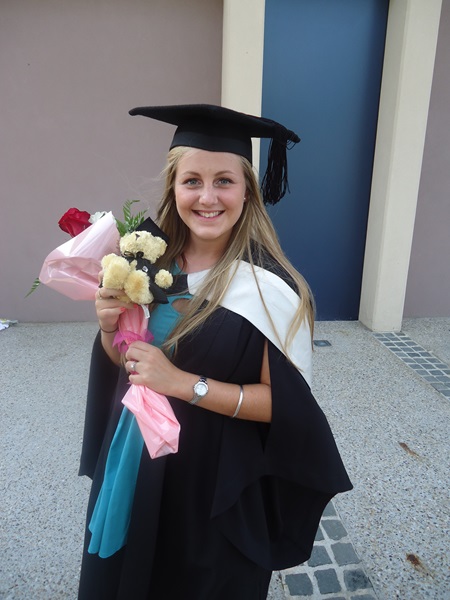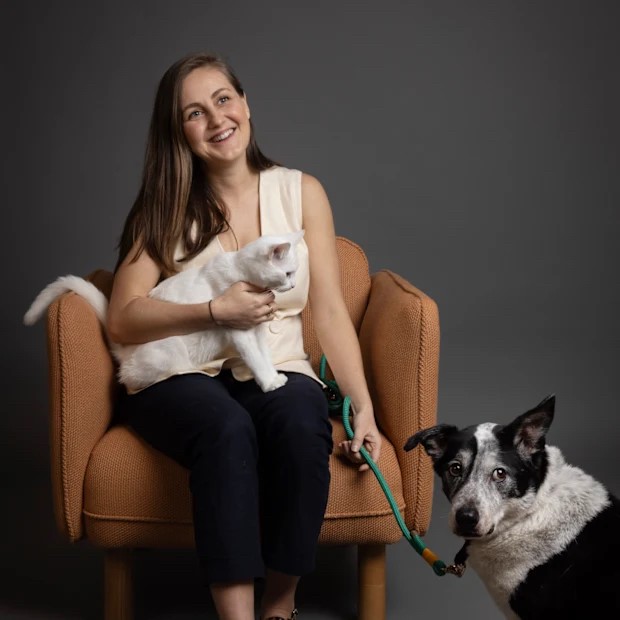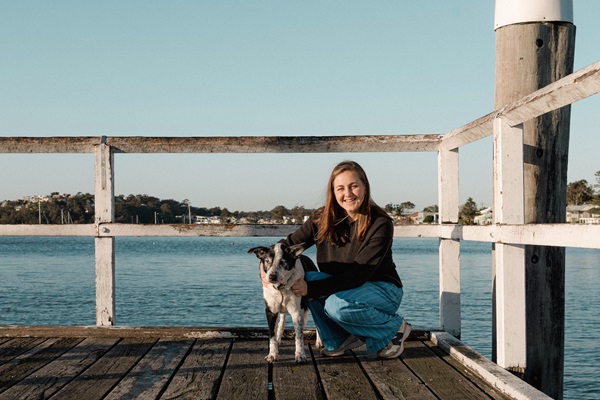Just six years after graduating from The University of Queensland, Anna Podolsky turned a personal concern for her dog’s wellbeing into one of Australia’s most successful pet wellness startups. Today, her company Lyka Pet Food is reshaping the way pet owners think about nutrition – and it all started with an experiment inspired by her mathematics-focused science degree.
Ms Podolsky became concerned when her border collie cross, Lyka, became lethargic and unwell, was constantly scratching, and began suffering from severe dental issues. A vet even recommended removing some of her teeth. “We were feeding her premium kibble, but upon further research we were shocked by the ingredients in her food,” Ms Podolsky said. “They were very different to the whole foods we were eating ourselves.”
 At the time, Ms Podolsky was working as a management consultant with Bain & Company in Chile. The language barrier made things harder: she was using Google Translate to decipher the Spanish ingredients lists on Lyka’s food. Out of frustration – and curiosity – she decided to cook her dog’s meals herself.
At the time, Ms Podolsky was working as a management consultant with Bain & Company in Chile. The language barrier made things harder: she was using Google Translate to decipher the Spanish ingredients lists on Lyka’s food. Out of frustration – and curiosity – she decided to cook her dog’s meals herself.
Within weeks, the results were remarkable. Lyka’s itching stopped, her energy returned, and even her dental health began to improve. What began as a small kitchen experiment soon evolved into a vision for a business that would challenge the norms of the multi-billion-dollar pet food industry.
“About 80 per cent of pets eat a processed diet,” Ms Podolsky said. “After seeing the impact that fresh food made on Lyka, I wanted to see a world where 80 per cent of pets ate a real-food diet.”
That vision would become Lyka Pet Food, named after the dog who inspired it.
The science of entrepreneurship
Ms Podolsky credits much of her success to the mindset she developed while studying at UQ, where she completed a UQ Bachelor of Commerce (Finance) and a Bachelor of Science (Mathematics).
“My degree – majoring in mathematics – played a huge role in shaping how I think,” she said. “Mathematical skills were crucial from day one. My time at UQ provided me with a strong analytical base, which has been pivotal in deeply understanding the numbers, helping me make significant decisions that have shaped the company. I learnt to approach problems analytically, test hypotheses, and make decisions grounded in evidence. That mindset has been instrumental in building Lyka, where data and scientific rigour underpins everything we do.”
 From the company’s product formulations to its business strategy, that evidence-based approach remains central. “Whether it’s developing growth strategies or evaluating the long-term health outcomes of fresh feeding, that scientific foundation ensures we’re always guided by facts and logic, not assumptions,” she explained.
From the company’s product formulations to its business strategy, that evidence-based approach remains central. “Whether it’s developing growth strategies or evaluating the long-term health outcomes of fresh feeding, that scientific foundation ensures we’re always guided by facts and logic, not assumptions,” she explained.
For Ms Podolsky, this mindset has also shaped Lyka’s culture. “It’s helped me foster a culture of curiosity and continuous improvement where we’re constantly testing, learning, and refining,” she said.
That process of constant iteration – testing small ideas, learning from data, and scaling what works – mirrors the scientific method itself. For Ms Podolsky, entrepreneurship is not so different from conducting an experiment. “Science teaches you to hypothesise and experiment, and entrepreneurship is really just that – experimentation at scale.”
From the lab to the startup world
Ms Podolsky’s academic background gave her more than technical skills – it gave her a way of thinking that encourages curiosity, resilience, and adaptability. She recalls her time at UQ as a formative experience not only for the knowledge she gained, but for the people who surrounded her.
“What stands out most from my time at UQ are the peers who challenged me to think bigger,” she said. “One of the most impactful parts of my experience was how interdisciplinary it was – I was surrounded by people who were applying science in completely different ways, from research to policy to business.”
That exposure to diverse perspectives gave her confidence to combine scientific thinking with business strategy. “That diversity of thinking really shaped how I approach problems today and gave me the confidence to blend science and mathematics with entrepreneurship in ways I might not have imagined at the time.”
After several years working in high-pressure consulting roles, Ms Podolsky found herself searching for deeper purpose. “Although I loved working on challenging business problems with high-calibre colleagues at Bain & Co., the part that was missing for me was impact,” she said. “I wanted to work in an industry I was truly passionate about. After the experience with Lyka, everything clicked into place.”
Building a business, one experiment at a time
Ms Podolsky began developing Lyka in her spare time while still working full-time. “I started by validating the business model and developing the initial concept in the evenings and weekends,” she said. Her first “lab” was her father’s kitchen, where she spent hours cooking and refining recipes that Lyka the dog would happily taste-test.
 She launched a minimum viable product – a small, testable version of the service – to see if other pet owners shared her interest in fresh food diets. The response was overwhelmingly positive. Eighteen months later, she left her consulting role to focus on Lyka full-time, joining forces with Sydney veterinarian Dr Matthew Muir to ensure the company’s nutritional science was robust.
She launched a minimum viable product – a small, testable version of the service – to see if other pet owners shared her interest in fresh food diets. The response was overwhelmingly positive. Eighteen months later, she left her consulting role to focus on Lyka full-time, joining forces with Sydney veterinarian Dr Matthew Muir to ensure the company’s nutritional science was robust.
As a young founder, Ms Podolsky faced steep learning curves across multiple disciplines – from product development to supply chain management. “One of the biggest barriers to getting Lyka off the ground was the breadth of knowledge required,” she said. “As a founder – particularly as a bootstrapped founder – you need to know a little bit of everything, from product development to engineering to marketing.”
To meet that challenge, she built learning into her everyday routine. “Most of my ‘in-between time’ – like walking Lyka, cooking dinner, or commuting – I’m listening to an audiobook or podcast,” she said. “I choose what to listen to, or read, depending on the stage of the business and the challenges we’re facing.”
That habit has served her well as Lyka has grown from a tiny startup into a fast-scaling company. “Two years ago, we had 10 people in our team – now we have over 200,” she said. “As a leader, it’s important to always be one step ahead in order to provide clarity and direction for the rest of my team.”
A new era for pet wellness
What began as an experiment in her family kitchen is now a thriving company with a mission to redefine pet nutrition and wellbeing. Lyka’s meals are freshly prepared with human-grade ingredients and tailored to each dog’s needs. The company’s data-first approach – monitoring pet health data and customer feedback to continually refine formulations – continues to set it apart in the market.
Looking ahead, Ms Podolsky hopes Lyka will lead a broader shift in how society approaches pet care. “Traditionally, mainstream pet care has focused on providing the bare minimum solutions, which are often fast and cheap,” she said. “These days, pets are more than members of the family. They have a special place in our lives, and pet parents are expecting care solutions that mirror how they approach their own health care.”
“In the medium to long term, we’re excited to develop innovative pet-care approaches that will help our pets live longer and healthier lives.”
Lessons for the next generation of science entrepreneurs
Reflecting on her journey, Ms Podolsky hopes UQ science and mathematics students will recognise how valuable their training can be.
“My biggest message would be: don’t underestimate how valuable your mathematics training is in business,” she said. “The ability to analyse data, think critically, and problem-solve creatively is exactly what drives innovation.”
Her story – and Lyka’s – are proof that scientific thinking, when combined with passion and persistence, can transform not just a single dog’s life, but an entire industry.
Read more about Anna’s journey, and easy ways to improve your dog’s diet, in UQ’s Contact Magazine.



